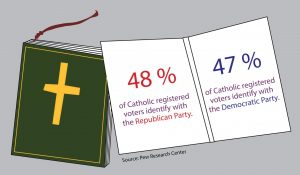The Future of the Affordable Care Act
Presidential candidates’ health care plans and their impacts on college students
ANDY BABCOCK
The future of health care for New Yorkers, college students and all other American residents will soon be determined by the outcome of this election.
October 28, 2020
The Affordable Care Act (ACA), commonly known as Obamacare, expanded health care to millions of Americans who were previously uninsured. It was signed into law in 2010 by former President Barack Obama and went into effect in 2014 under his administration. Since its implementation, it was met with both considerable praise and condemnation across political lines.
The presidential candidates, Donald Trump and Joe Biden, have entirely different plans regarding the future of the ACA. Trump would like to see it repealed, while Biden’s presidential plans include countering changes made by the current administration and building on Obama’s previous contributions.
A Repeal of the ACA Under Trump
Through several executive orders and his collaboration with Congress, Trump has already modified and weakened some of the main provisions of the ACA throughout his presidency.
He most notably terminated the individual mandate that required citizens to obtain an insurance plan or run the risk of paying a penalty. Additionally, states were able to add provisions in the ACA requiring Medicaid beneficiaries to prove that they either worked or went to school in order to retain their coverage.
Trump also stated that he intends to make private insurance plans cheaper by eliminating Obamacare because it increased insurance premiums after the first few years of its implementation. Without a public option, Trump claims insurance premiums would decrease, which may include college plans. To do this, his administration filed a lawsuit to the Supreme Court to overturn this public option.

During the presidential debate on Oct. 22, Trump claimed that if the Court fails to eliminate the ACA, his administration will still “run it” with modifications.
Trump claimed that he would institute a “better” health care plan that would protect people with preexisting conditions. However, he has not provided a clear proposal for how he and his administration would do this.
Expanding the ACA With ‘Bidencare’
Biden, on the other hand, has called for building on the current ACA. Central tenets of his health care platform include statements like “health care is not a privilege, it’s a right” and “everyone should have affordable health care.”
During the last debate, he proposed a public option called “Bidencare.” Biden expressed that he wants to support private insurance as well as enhance public plans. He aims to introduce a Medicare-like public option for people who do not like their employer-sponsored coverage or cannot afford health insurance. Additionally, this plan would automatically enroll millions of low-income Americans in the 14 states that have not expanded their Medicaid options.
Biden expects that his plan would create healthy competition for private insurance companies and force them to lower their premiums, which he expects will also lead to negotiations for cheaper drug prices. He plans to raise taxes on those with an income of over $400,000 per year to finance the $750 billion this plan would require over 10 years.
How Biden or Trump’s Plans Will Affect College Students
During the pandemic, 12 million people lost their employer-based health insurance. If the ACA is repealed, another 20 million people, including college students, would also lose their health insurance.
Since its institution, the ACA decreased the number of uninsured college students and substantially increased coverage for students of color. Moreover, the law decreased the racial coverage gap between Black and Hispanic students and their white counterparts.
If the law was repealed, college plans, such as Fordham’s Aetna health insurance, would become the most affordable option for students losing their coverage. The Aetna insurance plan costs students $3,401 annually, which is a price some students cannot afford.
These institutional plans already offer cheaper premiums than other private options in the marketplace. However, not all students can afford these added costs. Although 90% of students go to colleges that offer these insurance plans, some do not.
Obamacare made great strides in insuring millions of Americans who previously lacked coverage. However, concerns still remain regarding the ways in which the ACA has increased premiums. Like so many other current issues, the future of health care depends on this election.














